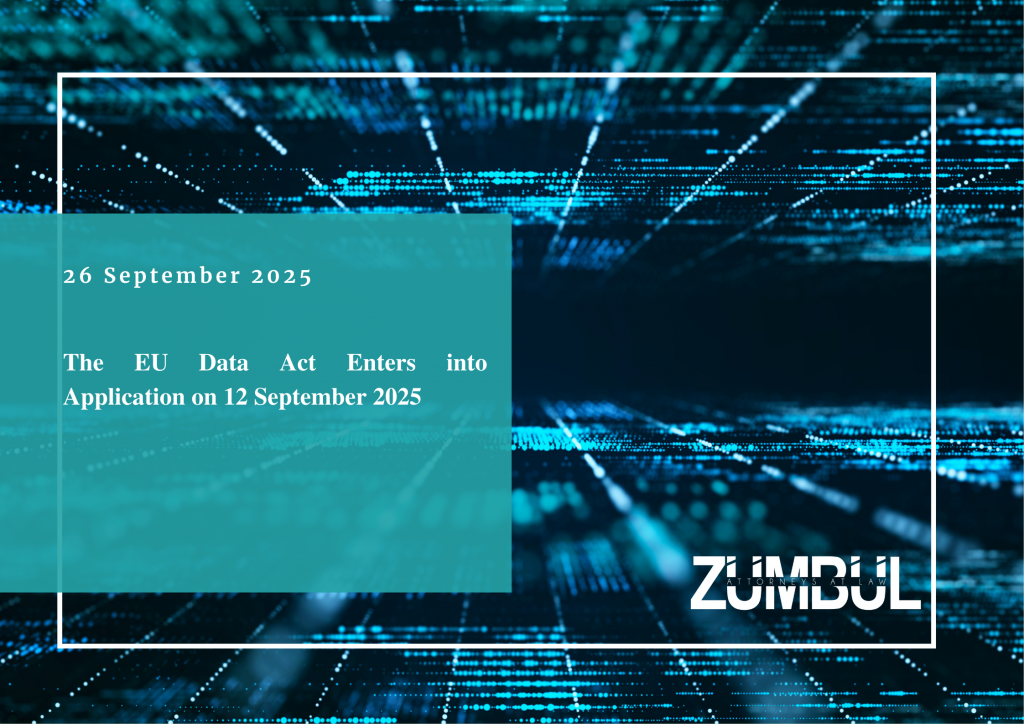Duyurular

The EU Data Act Enters into Application on 12 September 2025
The Data Act, adopted by the European Commission (“Commission”), has been the subject of an information note (“Note”) published on the Commission’s official website.
The key points highlighted in the Notice can be summarised as follows:
- The Data Act, one of the key pillars of the European Union’s (“EU”) objective of shaping its digital future, has been entered into application on 12 September 2025. This Regulation has been designed to strengthen the EU’s data economy and to foster a competitive data market.
- One of the key objectives of the Data Act has been defined as ensuring fairness in the data economy and as empowering users (businesses or individuals that own, lease or rent connected products) to reap value from the data they generate.
- In this context, users of connected products (e.g. connected cars, industrial machinery, smart-home devices) have been granted the right to access, use and port the data co-generated through their use of such products.
- The data may be shared directly with another entity (“third party”) by users, or may be requested to be shared with a third party of their choice through the data holder (excluding gatekeepers under the Digital Markets Act).
- The data has been required to be made available to users free of charge by data holders. However, the data obtained has not been permitted to be used to develop a competing connected product. In addition, any non-personal data generated by the product has not been permitted to be used by the data holder without the user’s agreement.
- To protect the confidentiality of trade secrets, certain measures have been permitted to be agreed between the data holder and the user/third party.
- Reasonable compensation has been permitted to be requested from the data recipient by data holders obliged to share data. However, micro enterprises, SMEs and non-profit research organisations have not been permitted to be charged more than the costs incurred for making the data available.
- All European businesses seeking to acquire data, in particular SMEs, have been intended to be protected by the Data Act against unfair contractual terms imposed on a non-negotiable basis by a party in a stronger market position.
- Minimum requirements have been set by the Data Act to ensure that customers (both private and public sector) have been enabled to switch from one provider to another in a free, fast and fluid manner.
- During the transitional period (from 11 January 2024 to 12 January 2027), costs related to switching and data egress have been permitted to be charged to customers by providers.
- Public sector bodies have been enabled to be granted access to data held by the private sector in situations of exceptional need (e.g. public emergencies such as major natural disasters, pandemics or cybersecurity incidents). These requests have been required to comply with specific strict principles and conditions.
- In the absence of an international agreement, data have been permitted to be accessed or transferred only where the legal system of the third country has been required to meet certain safeguards protecting European rights
- Member States have been required to designate one or more competent authorities to ensure the effective implementation of the Data Act. Where more than one competent authority has been designated, a data coordinator has been required to be appointed to act as the single point of contact at the national level.
You can access the full text of the Note here.
Kind regards,
Zumbul Attorneys-at-Law
All information and documents on our website have been prepared by Zumbul Attorneys at Law for general informational purposes only, in accordance with the Attorneyship Law, other relevant legislation and the Professional Rules of Attorneyship of the Union of Turkish Bar Associations. These publications are not intended for advertising or commercial purposes. The information and documents provided are of a general nature and under no circumstances, do they guarantee or warrant that the content is complete, accurate, up-to-date, or reliable. You should not rely on the information and documents on this website without first consulting a lawyer or expert. The links included in our website’s publications are sourced from publicly available materials and are provided solely for the convenience of visitors in accessing additional information. These links do not constitute any form of recommendation or endorsement of the linked persons, institutions or organizations. The information on this website does not in any way constitute legal advice or establish an attorney-client relationship with visitors to the site. All content on this website is the property of by Zumbul Attorneys at Law, and no content may be copied, reproduced, or used without prior written permission.
 Türkçe
Türkçe English
English